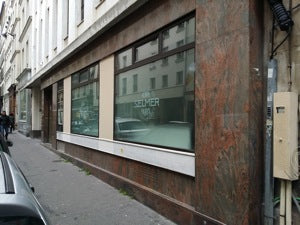
Buying a bass clarinet in 2014
Share
So, I just came back from Paris after visiting the Selmer factory and buying some horns. I was trying their new Selmer Privilege Bb and A clarinets (totally amazing) and 5 Privilege bass clarinets. I wanted to update everyone on how you can go about buying a horn (at least from Selmer), and how you can get it back to the US in one piece. It's actually easier than ever.

Here's how: make an appointment with Selmer in Paris telling them when you plan to be there — and of course make sure they have a few horns for you to try during that time. (They're always making them but they do produce in cycles, so just be sure you're going during a production run.)
By the way, they speak English there. (French too.)
Then, get to Paris however you can. We used Airbnb which lined us up with a great little apartment in the Latin Quarter for about $120 a night. Not bad for Paris.
Once you get to the office, they'll have a room ready for you with a bunch of horns for you to try. Be sure to spend some quality time with the horns, but don't feel compelled to pick one out right there and then. I went on a Friday, then spent the weekend hanging out in the city, going back Monday morning to make a final decision.
Once you do decide, you have a few options, each with its own pros/cons:
- Pay for it in Euros and take it with you.
- Pros: you get to take the horn with you and it doesn't have to be shipped. Plus, you can get the VAT (consumption tax) refunded at the airport, which can amount to thousands of dollars. (Info about how to do this is here). Finally, and I am not condoning breaking the law, but I've heard that some people don't declare the instruments when going through US Customs.
- Cons: you have to pay in Euros, and the credit card foreign transaction fee you incur if your card charges you (mine doesn't) might amount to several percent on top of the cost. If you're totally honest with Customs back in the US, you'll have to pay duty as well.
- Selmer works with a US distributor to have it shipped back to the US. (Substitute your country if you're not in the US)
- Pros: Besides not having to carry the instrument along on the plane, and saving a few credit card fees, not much.
- Cons: you will probably wind up paying about 20% on top of the cost of paying for it in Paris — assuming that you don't have a fee-less credit card, and you declare the instrument at customs.
Bonus: I wound up getting (almost) enough frequent flier miles on the purchase to pay for another trip to Paris!
EDIT July 3, 2014:
Here are the costs associated with buying the instrument.
Flight to Paris: Let's say conservatively you will pay $1,000. If you travel off-season like I did, it could be less than half of that, so if you can wait, wait.
Staying in Paris: I used AirBnB. I stayed in a tiny apartment in my favorite part of town. It was clean and, well, just perfect. And it cost me about $120 a night. SUPER cheap considering the alternatives. Of course, if you know someone there, it's even better.
Total cost for 4 nights: $480
Eating in Paris: All I can say is, if you aren't eating well in Paris, you're an idiot. And, if you stay in an apartment, you can simply go to the grocery store and pick up what you want instead of eating out all the time. That's what I did...mostly.
Total cost: I'm (not really) embarrassed to say it was well over $600. Yours will likely be cheaper. :)
Getting around Paris: You can easily walk most of where you need to go. If you stay near the Selmer workshop, you won't really have any associated commuting costs.
Okay, now down to the nitty gritty.
Bass Clarinet: I landed and went to the factory (jet lag and all) and picked from 5 brand new horns. I also tried 15 necks and a bunch of mouthpieces. The instruments were all excellent, mainly because they hadn't been shipped all over the place to get to my mouth. I played them all, chose two, and then went home to take a nap. Then, a weekend intervened, and I had to wait until Monday to get back into the shop. Monday I played them all again (blindly; my wife was taking notes on serial numbers but I didn't know which I was playing), and I selected the two I wanted, selected the necks I wanted, had it adjusted by the guy who made it, and then paid my bill.
Total cost (for one bass, a neck and a case. No mouthpiece): $11,000-ish. (Cost at the Woodwind and Brasswind: $12,659). Your cost will depend on currency exchange rates.
Total (for me): $12,600. That's with a trip to Paris thrown in.
Do it. It's SO worth it.
Edit: January 2024:
Just buy it from me. ;)
Mike

